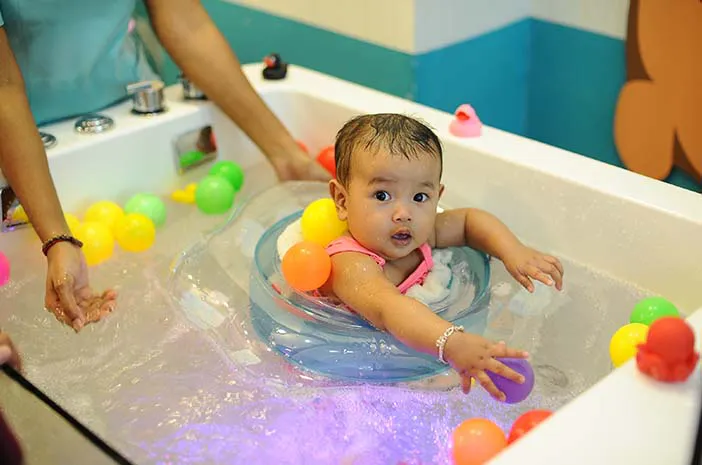In a world brimming with an array of parenting choices, one may ponder: could indulging your little one in a baby spa truly revolutionize their well-being? As an increasingly popular practice, baby spas offer a unique blend of gentle care and therapeutic benefits that enchant both infants and their caregivers. Yet, as parents navigate this burgeoning trend, it is crucial to weigh the multitude of advantages against potential challenges in pursuit of holistic development for their offspring.
Baby spas are designed to create a soothing environment where infants are introduced to water activities, massage, and sensory experiences that are age-appropriate. But what exactly are the manifold advantages of enrolling your precious child in such an establishment? Exploring these benefits may elucidate how baby spas contribute to the overall development of your little one.
1. Enhanced Bonding Experience
One of the primary benefits of baby spas is the opportunity they provide for enhanced bonding. During sessions, parents often engage in activities that deepen the emotional connection with their infants. Skin-to-skin contact during water play fosters trust and familiarity. Moreover, these intimate moments can invoke a profound maternal or paternal instinct, fortifying the emotional landscape of the parent-child relationship.
2. Promotion of Motor Skills Development
As babies engage in buoyant activities, they instinctively utilize various muscle groups, promoting gross motor skills development. Gentle splashing and kicking in water encourage the strengthening of arms and legs. These movements not only empower infants but also lay the groundwork for future physical coordination. As caregivers witness their child’s burgeoning abilities, the experience can be both exhilarating and rewarding.
3. Alleviation of Stress and Anxiety
In today’s tumultuous environment, stress is an unwelcome intruder, even for the youngest populace. Fortunately, the gentle atmosphere of a baby spa can serve as a refuge. Immersion in warm water coupled with soothing music creates an ambiance conducive to relaxation. Scientific studies suggest that consistent exposure to calming environments can reduce cortisol levels, which translates into less stress for both the infant and the parent.
4. Sensory Exploration and Stimulation
The essence of a baby spa lies in its vibrant usage of sensory stimuli—sight, sound, touch, and even taste. Colorful toys, soft textures, and gentle sounds beckon infants, cultivating curiosity and wonder. This sensory engagement is integral to cognitive enrichment. Additionally, experimenting with varied stimuli allows children to develop critical thinking skills as they learn to understand their environment.
5. Improved Sleep Patterns
Anecdotal evidence and preliminary studies indicate that infants who partake in baby spa experiences often exhibit improved sleep patterns. The combination of physical activity and relaxation may lead to a more restful slumber. The gentle dynamics of water and massage promote the release of endorphins, facilitating a serene transition to sleep. Parents may find themselves grappling with an unexpected challenge: will this newfound tranquility lead to longer nights?
6. Fostering Social Interaction
Baby spas often serve as communal havens where like-minded parents gather to watch their children revel in the pleasurable experiences of the water. Such settings facilitate social interaction for both the young ones and their guardians. Witnessing other babies navigating similar learning curves can imbue parents with confidence and camaraderie. However, one may ask—will the distractions of socialization overshadow the individual needs of the child?
7. Encouragement of Healthy Habits
Engaging your child in regular baby spa sessions early on may instill habits of physical wellness that can resonate throughout their lives. Early-water experience is often correlated with later participation in swimming and physical activities. Furthermore, these moments can cultivate an appreciation for health and self-care in future generations. Nevertheless, a challenge lurks: how can one ensure that these positive habits are sustained beyond the spa’s comforting walls?
8. Natural Relief for Discomfort
Babies often experience discomfort from various conditions, including colic, teething, and general irritability. Warm water has long been celebrated for its soothing properties. Hydrotherapy can offer respite from physical discomfort by allowing infants to move freely, stretching their muscles and comforted by the gentle embrace of water. For many parents, the prospect of easing their child’s discomfort directly through these methods emerges as a delightful answer to their challenges.
9. Cultural Relevance and Heritage
In numerous cultures around the globe, water play and communal bathing practices have deep roots. Integrating a baby spa experience into your child’s early life can serve as a bridge to ancestral customs, fostering cultural awareness and pride. Parents may find joy in invoking these traditions while sharing them with the next generation. However, the question arises: how can one achieve a balanced integration without losing sight of contemporary parenting values?
In conclusion, the manifold benefits of baby spas abound, offering unparalleled opportunities for development, relaxation, and bonding. Yet, potential challenges accompany each advantage, compelling parents to reflect on their unique circumstances. Grasping these dynamics facilitates informed decision-making about their child’s wellness journey. So, as you tantalizingly contemplate the prospect of introducing your little angel to a baby spa, remember to navigate this exciting realm with mindful compassion.




Leave a Comment